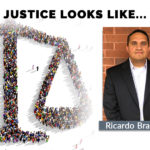EDITOR’S NOTE: “Justice looks like …” is a special series in the Voices column. Readers will have the opportunity to consider justice from numerous viewpoints. The series is based on each writer’s understanding of Scripture and relationship with Jesus Christ. Writers present their own views independent of any institution, unless otherwise noted in their bios.
You are encouraged to listen to each writer without prejudgment. Then, engage in conversation with others around you about what justice looks like to you.
Click here for more information about the series. Click here to read the full “Justice looks like…” series.
The white church in America is learning racism is not merely about our individual actions and decisions.
As a civil human being—more so as a child of God—we know better than to be racist, than to do racist things. In fact, in our effort not to be racists, we work hard to talk as though race doesn’t exist. Being colorblind was the way to be nonracist, we were taught. I suppose it meant if we didn’t see race, we couldn’t perpetuate it or contribute to racism.
Beverly Daniel Tatum introduced us to the idea that being nonracist is not the end goal for racial justice. Even if my actions and decisions are wholesome, faithful and just, I am part of a world in which racism affects the Black people in my life. Racism is in our schools, our nonprofits and our churches—even the best ones, even the ones seeking racial justice.
Racism is about systems
Racism, therefore, is not simply about my actions; it is about systems that are predominantly white, that have not embraced Blackness, and as a result, remain oppressive, exploitative and marginalizing.
Nice white people are still complicit in racist structures. And, the nice white places we love still hurt Black people. Here, Black voices are on the margins, Black leaders are asked to do more than their fair share to help white people manage race relations, and Black brothers and sisters never experience our ideal when white family members make the decisions and call the shots.
Antiracism is required
As a result, antiracism is what is required of us, and it requires more from us than being nonracist. Antiracism requires working actively against the racism of our structures in a society where the white way is the right way, even when unintentional.
Sign up for our weekly edition and get all our headlines in your inbox on Thursdays
Antiracism requires a cultural humility to listen to and learn from the Black community. Doing so will elicit feelings that must move from white guilt to godly grief, as Jemar Tisby teaches. From that grief, we are able to join in lament.
Then, we are able to move to the love of neighbor God asks of us and join in the work of liberation. This liberation is a genuine freedom for Black people from white systems and toward the possibility of mutual, meaningful relationships.
Justice, not reconciliation
These efforts are not about racial reconciliation—which is a myth, since Black and white Americans never have had a relationship that can be reconciled—but about racial justice.
Racial justice is work for fair treatment and equal outcomes for Black people and people of all races. Racial justice is a reflection of God’s desire that all people be treated with dignity and respect. Racial justice is the recognition we all bear God’s image and likeness with equal status.
The essence of God is within each Black child of God, and we therefore must highlight how Black lives not only matter, but are essential to life together in Christ. It is easy to say, but it requires work.
The good news of the gospel of Christ for all people requires nothing less of us than this work of antiracism for racial justice. The work of God within us calls us to see God in others. Through cultural humility, we can see other people as the expert of their experiences.
The work of God within us calls us to see the racism still present all around us. Ignoring this keeps us culpable in perpetuating racism; our silence is violence.
And, the work of God within us calls us to see antiracism is the journey toward the kingdom goal of racial justice.
Jon Singletary is dean of Baylor University’s Diana R. Garland School of Social Work. The views expressed are those solely of the author.
Click here to read the full “Justice looks like…” series.















We seek to connect God’s story and God’s people around the world. To learn more about God’s story, click here.
Send comments and feedback to Eric Black, our editor. For comments to be published, please specify “letter to the editor.” Maximum length for publication is 300 words.